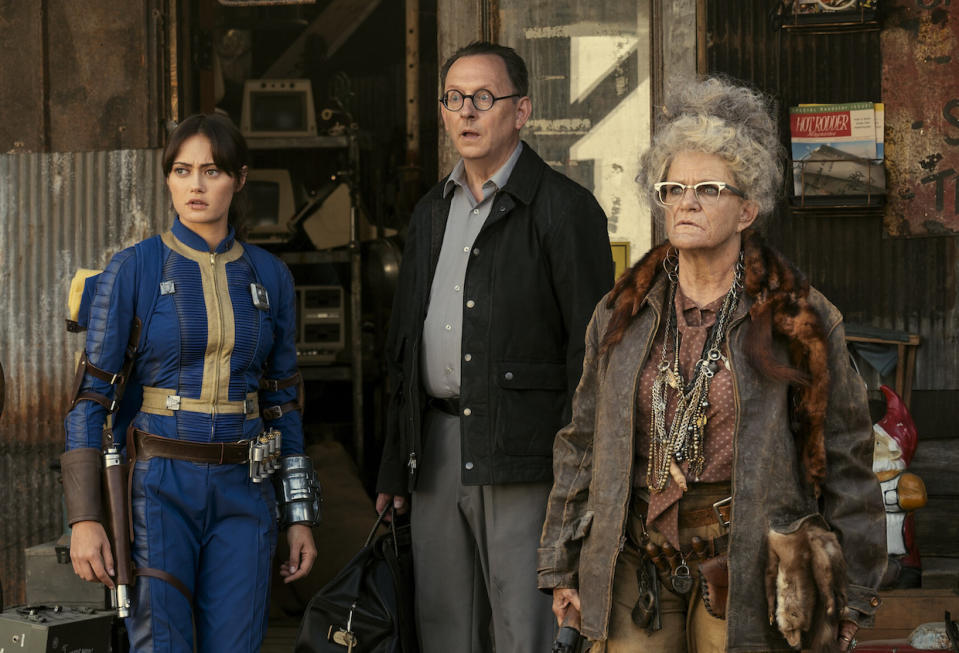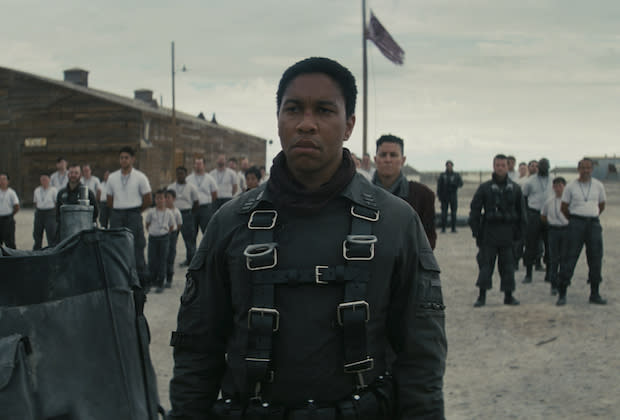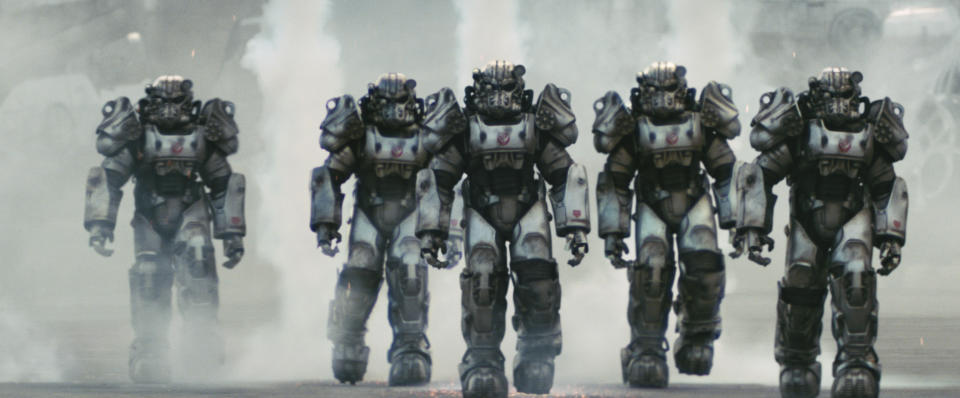Fallout Review: Walton Goggins Is the Secret Weapon in Daunting, Hilarious Video Game Adaptation


Since 1997, the Fallout franchise of video games has captivated hordes of RPG fans with its original setting, political edginess, and that gloriously nostalgic yet contextually bleak soundtrack. So how do you translate all of that into a high-budget, high-octane streaming series that welcomes newbies to this hyper-specific world and atmosphere, and comes from the creators of Westworld, no less?
Well for starters, it helps to cast Walton Goggins.
More from TVLine
Travis Kelce to Host Celebrity Edition of Are You Smarter Than a 5th Grader?
The Night Manager Seasons 2 and 3 Ordered at Amazon; Tom Hiddleston Set to Return
Fallout to Get Early Full-Season Drop on Amazon - Find Out When
“Walton Goggins plays The Ghoul” may not be a sentence that everyone will immediately understand, but plenty enough will need no further explanation before digging into Prime Video’s Fallout, which drops all eight of its first season’s episodes on Wednesday, April 10 at 9 pm ET.
The series, from showrunners Geneva Robertson-Dworet and Graham Wagner and EPs Lisa Joy and Jonathan Nolan, “cordially invites you to the end of the world,” fittingly with a premiere titled “The End.” That’s because in this world, the world is already over. The show opens on a seemingly idyllic afternoon at a child’s birthday party in Los Angeles, only you can tell right away that there’s an odd retro-futuristic flair to the setting. Though most people are dressed like it’s the 1950s, we’re actually in 2077, an alternate version of our world that progressed technologically but not culturally from the mid-20th century onward.

So even during this fairly standard day in L.A., it’s clear that something is amiss in the background. Everyone appears anxious about a possible nuclear war breaking out at any moment — and sure enough, that’s what happens. But rather than dwell on the immediate, ahem, fallout of such an event, the show smash-cuts to over 200 years later, and we’re now following a young woman named Lucy (Yellowjackets‘ Ella Purnell) who lives in Vault 33, an underground bunker that was designed to hold and protect (and maybe indoctrinate) some of the last survivors of the human race.
Lucy loves her literally sheltered life, which holds onto remnants of the old world that was destroyed centuries ago, and she certainly hopes to spread that same plucky optimism and enthusiasm for a better society (in her words, “America”) in the near future, when Vault Dwellers like her can return to the surface world once radiation levels are low enough.
It isn’t long, though, before Lucy finds herself with little choice but to visit the “Wasteland” earlier than expected as she goes on a mission aboveground to find her father (Twin Peaks‘ Kyle MacLachlan). The post-apocalypse apocalypse at her feet is one she’s not at all prepared for, save for some basic training and a persistence that makes her remarkably charming to watch. She encounters many an irradiated monster, as well as the monsters that reside in actual people who are somehow capable of surviving such a merciless world.
Armed with her noticeably blue jumpsuit and a “Pip-Boy” wrist device that will put many a Swiss Army knife to shame, Lucy explores dilapidated settlements and husks of a civilization that no longer exists with an initial aimlessness that will feel all too familiar to fans of the games.
She also gets caught up in a larger conspiracy around a scientist and his dog. Sounds about right.

That scientist, Wilzig — played by Michael Emerson, who was practically born to reside in the Fallout world — is being hunted by some of the most dangerous factions in the Wasteland, namely the Brotherhood of Steel, a proto-religious technology cult where “Knights” don “Power Armor” that lends them increased strength and remarkable durability. One of these Brotherhood of Steel denizens is Maximus (Disjointed‘s Aaron Moten), a low-ranked squire who believes finding this scientist can help him realize his dream of becoming a true Knight.
After screening the first three episodes, it’s clear that the show’s secret weapon is Goggins. The Justified favorite opens the series as Cooper Howard, a down-on-his-luck celebrity forced to replicate his cowboy schtick at kids’ parties, only to reappear centuries later as “The Ghoul,” an actual gunslinger with a notorious reputation and shady backstory that promises to be unpacked in subsequent episodes. He really does look like a “ghoul” to be clear, with an appearance best described as “The Red Skull meets one of the flayed characters in Game of Thrones.”
Goggins has such an instant, infectious charm as the seemingly immortal badass who has taken to the rules of the wasteland like a cockroach to radiation. And once you find out the Ghoul’s agenda clashes with Ella’s, it’s hard not to wonder how anyone else in his way will manage to survive.

But that’s sort of the fun of this show in its early goings. Even at its most cynical and hard-fought, it’s a story and atmosphere that fully embraces its source material and the inherent contradictions therein. Yes, it’s a serious, daunting and depressing premise, but it’s also hilarious and eye-poking without being too smug, for the most part. When the show frequently calls upon its established “old war” songs to break up the tension with some moody, ’50s-era melodies (most of which are straight from the video games), you just know that you’re watching something built on a seriously solid foundation.
It’s hard to say what the show’s ultimate message will actually be, though. Lucy’s story is so far a simplistic coming-of-age, loss-of-innocence setup, made more interesting of course by the spectacle and sheer audacity of this production design, which spares no details and Easter eggs for anyone who’s ever picked up a controller in this world. But is it a live-action world that pulls off the same density and wide scope? So far, yes on the density, not so much on the scope.
Perhaps by nature of its serialized format, Fallout makes the wasteland feel a bit claustrophobic, like everyone knows everyone else all the time everywhere, which granted isn’t always far off from the games themselves (at least recently), but in those you had far more capacity for “random encounters” where perhaps the most interesting, capsule-sized stories managed to find you, rather than the other way around.
That said, Fallout needs to find its own way, anyway. It can’t be a video game, so it has to achieve a larger purpose within its own restrictions. And on that token, it benefits from having a fully realized protagonist who isn’t just a blank slate for the player. The show takes the right risk in affording Lucy specificity as a character, and therefore a defined personality that can measure up to the wacky mayhem of the other weirdos she meets. The show’s clearly committed to being the definitive Fallout adaptation, a love letter to fans, no question, while still opening the vault door to welcome in just about everyone else brave enough to step inside.
THE TVLINE BOTTOM LINE: The Fallout show that fans of the games have always wanted has finally arrived, and it just might set the world on fire.
Get more from TVLine.com: Follow us on Twitter, Facebook, Newsletter

 Yahoo Finance
Yahoo Finance 